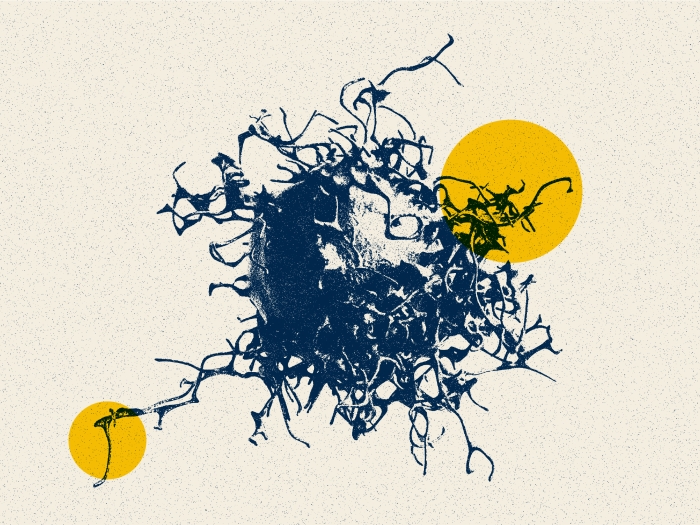Studies in mice reveal the mechanism that induces this severe side effect and point to a solution that kills the cancer without causing gastrointestinal issues
2:00 PM
Author |

Researchers at the University of Michigan Health Rogel Cancer Center have identified a mechanism that causes severe gastrointestinal problems with immune-based cancer treatment.
They also found a way to deliver immunotherapy’s cancer-killing impact without the unwelcome side effect.
The findings are published in Science.
“This is a good example of how understanding a mechanism helps you to develop an alternative therapy that’s more beneficial. Once we identified the mechanism causing the colitis, we could then develop ways to overcome this problem and prevent colitis while preserving the anti-tumor effect,” said senior study author Gabriel Nunez, M.D., Paul de Kruif Professor of Pathology at Michigan Medicine.
Immunotherapy has emerged as a promising treatment for several types of cancer. But immune checkpoint inhibitors can also cause severe side effects, including colitis, which is inflammation in the digestive tract.
Colitis can cause severe gastrointestinal discomfort, and some patients will discontinue their cancer treatment because of it.
The problem facing researchers was that while patients were developing colitis, the laboratory mice were not. So researchers couldn’t study what was causing this side effect.
To get past this, the Rogel team, led by first author Bernard C. Lo, Ph.D., created a new mouse model, injecting microbiota from wild-caught mice into the traditional mouse model.
In this model, the mice did develop colitis after administration of antibodies used for tumor immunotherapy. Now, researchers could trace back the mechanism to see what was causing this reaction.
In fact, colitis developed because of the composition of the gut microbiota, which caused immune T cells to be hyper-activated while regulatory T cells that put the brakes on T cell activation were deleted in the gut.
This was happening within a specific domain of the immune checkpoint antibodies.
Researchers then removed that domain, which they found still resulted in a strong anti-tumor response but without inducing colitis.
“Previously, there were some data that suggested the presence of certain bacteria correlated with response to therapy. But it was not proven that microbiota were critical to develop colitis. This work for the first time shows that microbiota are essential to develop colitis from immune checkpoint inhibition,” Nunez said.
To follow up what they saw in mice, researchers reanalyzed previously reported data from studies of human cells from patients treated with immune checkpoint antibodies, which reinforced the role of regulatory T cells in inducing colitis.
The antibody they used to stop the colitis was developed by Takeda Pharmaceuticals.
The Rogel team plans additional studies to further understand the mechanisms causing colitis and seeks clinical partners to move this knowledge to a clinical trial.
Additional authors are Ilona Kryczek, Jiali Yu, Linda Vatan, Roberta Caruso, Masanori Matsumoto, Yosuke Sato, Michael H. Shaw, Naohiro Inohara, Yuying Xie, Yu Leo Lei and Weiping Zou.
Funding for this work is from National Institutes of Health grants R01 DK121504, R01 DK095782, R01 DE026728, R01 DE030691, P30 CA046592; Takeda Millennium Pharmaceuticals, Canadian Institutes of Health, Crohn’s and Colitis Foundation, National Science Foundation grant IOS-2107215.
This work was supported by these Rogel Cancer Center Shared Resources: Single Cell Spatial Analysis, Tissue and Molecular Pathology
Paper cited: “Microbiota-dependent activation of CD4+ T cells induces CTLA-4 blockade-associated colitis via Fc-gamma receptors,” Science. DOI: 10.1126/science.adh8342
Sign up for Health Lab newsletters today. Get medical tips from top experts and learn about new scientific discoveries every week by subscribing to Health Lab’s two newsletters, Health & Wellness and Research & Innovation.
Sign up for the Health Lab Podcast: Add us on Spotify, Apple Podcasts or wherever you get you listen to your favorite shows.

Explore a variety of health care news & stories by visiting the Health Lab home page for more articles.

Department of Communication at Michigan Medicine
Want top health & research news weekly? Sign up for Health Lab’s newsletters today!




